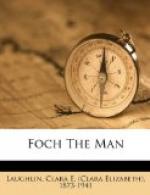But the attempt to break through the center Foch held, waxed fiercer as the Germans realized the strength opposing them on their right.
And on Tuesday, the 8th, Foch was unable to hold—save at certain points—and had to move his headquarters eleven miles south, to Plancy.
He had now reached the Aube, beyond which Joffre had decreed that he must not retire. On its north bank his gallant army must, if it could not do otherwise, “allow itself to be slain where it stands rather than give way.”
On that evening he sent Major Requin to the Forty-second Division with orders for the morrow. The most incredible orders!
The enemy had found his point of least resistance—on his right wing. He ought to strengthen that wing, but he could not. All the reserves were engaged—and the enemy knew it as well as he did. And it is a fixed principle of war not to withdraw active troops from one part of the line to strengthen another.
Only one part of his army had had any success that day: Toward evening the Forty-second Division and the Moroccans had made an irresistible lunge forward and driven the enemy to the north edge of the marshes.
They were weary—those splendid troops—but they were exalted; they had advanced!
Foch believes in the power of the spirit. He appealed to the Forty-second to do an extraordinary thing—to march, weary as it was, from left to right of his long line and brace the weak spot. And to cover up the gap their withdrawal would make he asked General Franchet d’Esperey to stretch out the front covered by his right wing and adjoining Foch’s left.
In a letter to me, Lieutenant-Colonel (then Major) Requin gives some graphic bits descriptive of that historic errand. He was a sort of liaison officer between General Grossetti, commanding the Forty-second Division, and the latter’s chief, General Foch, his special duty being to carry General Foch’s orders to General Grossetti and to keep the army chief informed, each evening, how his commands were being carried out.
“It was 10 P.M.,” he writes, “when I roused General Grossetti from his sleep in the straw, in the miserable little shell-riddled farm of Chapton.
“The order astonished him; but like a disciplined leader, he started to execute it with all the energy of which this legendary soldier was capable.”
The Forty-second came! While they were marching to the rescue the Prussian Guard in a colossal effort smashed through Foch’s right. They were wild with joy. The French line was pierced. They at once began celebrating, at La Fere-Champenoise.
When this was announced to Foch he telegraphed to general headquarters:
“My center gives way, my right recedes; the situation is excellent. I shall attack.”
For this, we must remember, is the man who says: “A battle won is a battle in which one is not able to believe one’s self vanquished.”




